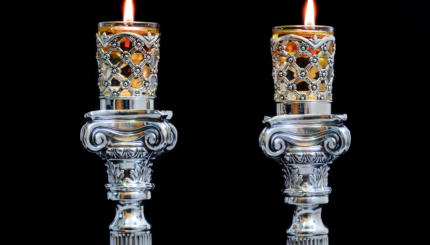Maftir is the last reading. On holidays and special shabbatot, the maftir is a reading from an additional scroll. The maftir for festivals relates the sacrifice brought on that occasion. This portion describes the sacrifice brought on the eighth day after the beginning of Sukkot, a day described as “a solemn gathering.” In synagogues that celebrate Shemini Atzeret and Simchat Torah on separate days, this maftir is read on both occasions. The last verse of this portion is read as part of the festival morning kiddush.
This English translation is reprinted with permission from Tanakh: The Holy Scriptures published by the Jewish Publication Society.
29:35. 0n the eighth day you shall hold a solemn gathering; you shall not work at your occupations.
29:36. You shall present a burnt offering, an offering by fire of pleasing odor to the LORD; one bull, one ram, seven yearling lambs, without blemish;

Help us keep Jewish knowledge accessible to millions of people around the world.
Your donation to My Jewish Learning fuels endless journeys of Jewish discovery. With your help, My Jewish Learning can continue to provide nonstop opportunities for learning, connection and growth.
29:37. the meal offerings and libations for the bull, the ram, and the lambs, in the quantities prescribed;
29:38. and one goat for a sin offering-in addition to the regular burnt offering; its meal offering and libation.
29:39. All these you shall offer to the LORD at the stated times, in addition to your votive and freewill offerings, be they burnt offerings, meal offerings, libations, or offerings of well-being.
30:1. So Moses spoke to the Israelites just as the LORD had commanded Moses.



